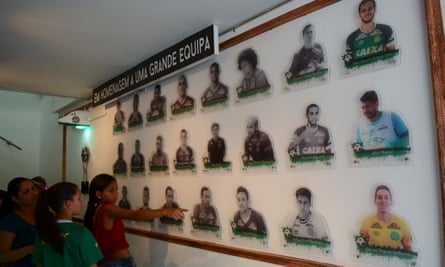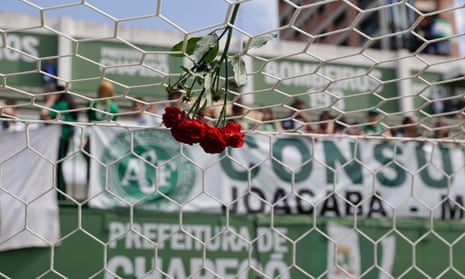Amanda Machado’s two-year-old son saved her from suicide. Adriana Saroli sees her granddaughter Ana Clara, a newborn baby, as the hope for better days and a new life. Guilherme Biteco has stopped watching football but still looks at recordings of his brother playing to find inspiration. It was not only the six people who were left alive after the Chapecoense plane crash who are survivors. As Tuesday’s anniversary of the disaster that killed 71 passengers and crew approaches, there are many more who are still rebuilding.
Twelve months ago the Brazilian club’s squad, the coaching staff, officials and the media were on their way to Medellín in Colombia for the first leg of the Copa Sudamericana final against Atlético Nacional. Having started out in São Paulo, they changed planes in the Bolivian city of Santa Cruz de la Sierra. The flight developed fuel and electrical problems and crashed into a mountain ridge a dozen miles from its destination. One journalist, two crew members and four players were found alive, but one of the Chapecoense quartet – the goalkeeper Danilo – soon died of his injuries.
So many lives were lost in the disaster but new ones have arrived. For many family members, children turned into the main reason to keep fighting and to get over the pain of bereavement. On Monday 28 November last year, Amanda Machado was in Porto Alegre to buy a wedding dress – her marriage was set for the Friday, four days later – when she received a call saying that Dener, a left-back and her fiancé, had died.
“I was lost. My first thought was to jump off the balcony, but I heard a voice calling – my son, Bernardo – and I didn’t go through with it. It was terrible. I stopped because I understood that I need to live to help my child,” she says.
Now Bernardo is three. Amanda explained to him that Dener died in a plane crash but it is hard for him to understand. “Bernardo says that he would like to visit heaven, because I said his father was living there. He hopes his father will come back one day. It’s complicated for him to understand what happened. He misses Dener a lot. Me too.
“December was the worst period in my life. I didn’t want to see my son because he is the image of his father. I went out every day to escape, to hide my depression. For one month, I slept only one hour a day. But, one day after Christmas, I was driving, I fell asleep and I crashed the car. It wasn’t serious but that was enough to change my habits and fight for survival.”
Adriana Saroli lost two family members in the plane crash: Caio Júnior, the coach and her husband, and Eduardo de Castro, the assistant coach and her nephew. But the tragedy could have been worse. Her son, Matheus Saroli, was with his father at the airport in São Paulo but did not board the plane because he had forgotten his passport. Matheus missed the flight but was gifted a new life and a daughter, who was born on 11 November. “Caio’s biggest desire in life was a granddaughter,” Adriana says. “Always he tackled my two sons about it. It had to be a girl. He would be so happy now. The same month of the year that Caio died, Ana Clara arrives for us. She is a gift. She is bringing us happiness again.

“More than once Caio said that we would have a granddaughter and that she would be like me. I jokingly complained: ‘Come on! Your daughter-in-law can’t have a baby looking like the mother-in-law.’ Ana Clara was born and she looks a lot like Matheus. And Matheus looks like me, not Caio. Caio’s dream came true.”
A plastic artist, she was forced to stop 10 years ago by tendinitis but is aiming to restart as soon as possible.
Jacqueline Madrid is Uruguayan and does not have a son. She has lived in Brazil since 2002, when she decided to leave Salto, in Uruguay, with Anderson Lucas, the Chapecoense kit man. November was a special month for her for many reasons, but all these good feelings turned into in nightmare. “I used to love November,” she says. “It’s the month of my birthday, the 17th, and my wedding anniversary, the 27th. But now it is horrible because it is when my husband died and I have no one to celebrate with me.”
Jacqueline lost her husband but not her strength. She works as Chapecoense’s secretary, a job that helps her to come to terms with the tragedy. “Chapecoense is very important in my life. When I come here to work, I feel stronger. Sometimes I go to the pitch and forget everything. It’s like God is hugging me. To many, the stadium brings bad feelings. But not to me. I need it.”
Sirli Freitas shares the sentiment. When her husband, Cleberson Fernando, the club’s press officer, died, she received an offer to work as Chapecoense’s photographer and accepted it. “It was a way to escape. At the same time I can see the club rebuilding, I know that I am rebuilding myself, too. We are living with strong emotions every day. Working in the same place with Follmann, Neto and Alan [the three surviving team members] helps me a lot. We help each other all the time. It’s just a miracle how they survived.”
She had two children with Cleberson: Pedro, who is nine, and Mariana, three. “It’s complicated for Pedro. Cleberson was his hero. This week he wrote a letter to his father. Yesterday we went to the cemetery. He stayed there, laid down on the grave for two hours. I would like to lie and cry with him. But I can’t. I need to be strong.”
With Cleberson gone, Sirli faces many challenges. An example was the first trip as club photographer, to Belo Horizonte in February. The week was full of mixed feelings, with Pedro apprehensive. “When I made my first trip, he was so strong, so smart. He sent me many messages during the day and took care of Mariana. He knows that we need to help each other.”
Football is not a passion for Pedro. He prefers art and music. When Cleberson died the boy felt guilty because he would like to have shared more moments with his father, who loved sport.
It is a different situation for Guilherme Biteco. He loved football, watched many games every day, from different championships and teams. But no longer does he revel in the game. Since his brother, Matheus Biteco, died, Guilherme, one year older, has stopped watching football. “I was addicted, watched all the games,” he says. “In the past, I would have been anxious to watch Juventus v Barcelona [on Wednesday]. Now, it’s just one more game that I will not see. I only watch the games of Paraná, because that’s the team I am playing for.”
The 23-year-old midfielder has helped Paraná win promotion to the top flight. In sporting terms he had a great season, probably the best of his career. Guilherme puts his success down to being inspired by watching Matheus. “I have recordings of some of Matheus’s best moments,” he says. “I watch them every day. When I’m on a bus going to a game, I get my mobile out to see the video. It’s my rule that makes me feel good. He was a warrior, an inspiration. I am here to win. I don’t want be remembered as the brother of Matheus Biteco who died in an accident. I want to have my own value.”
Matheus and Guilherme had played at Grêmio since childhood. Their first game together was in 2013, against Santa Cruz, a 5-0 victory. The goalkeeper was Jakson Follmann, who three years later survived the disaster. The brothers were so close that Guilherme took control of many family responsibilities, starting with Matheus’s son. “I need to take care of Miguel. It’s not an obligation. It’s love. We have many examples of children rebelling because they don’t have a father. I need to help and to love my nephew like a father as good as my brother was.”

In the courts, Chapecoense face more problems. The Colombian government is leading an investigation into the plane crash. The report’s deadline is this Wednesday, 29 November, but there may be a delay. The insurance company has offered $200,000 per person in compensation but this was refused by the families, who want around $400,000. Some families are struggling to pay the bills.
To help the families, two organisations were created: the Brazilian Association of the Victims of Chapecoense (Abravic) and the Association of Families and Friends of the Victims of the Chapecoense Flight (Afav-C). Since October, Chapecoense have been making monthly payments of R$28,800, around £6,700, to Abravic.
But sporting life goes on for Chapecoense, too. In the first year after the tragedy, the team won the Santa Catarina state championship and avoided relegation from the national top flight three rounds from the end of the season.
The rebuilding isn’t over, though. In 2018 the club will have more problems. The current squad were formed by loaned players or those on short-term contracts. A round of contract renewals has started but new players, certainly, will have to be brought in for next season.
The three survivors are still at the club. The left-back Alan Ruschel returned to action in August, in a friendly against Barcelona. The defender Neto has not played yet but is working to be part of the squad next year. Follmann, who lost his right lower leg in the crash, is studying and taking courses to become a director of Chapecoense. This month, when invited by the website globoesporte.com, he returned to the Arena Condá for a first full training session since the tragedy. Cahê Mota, Globo’s reporter, says: “Initially, he refused because he didn’t feel comfortable, safe, to do so. It’s not an easy situation. But he accepted and it was wonderful see him so happy, training once more.”
